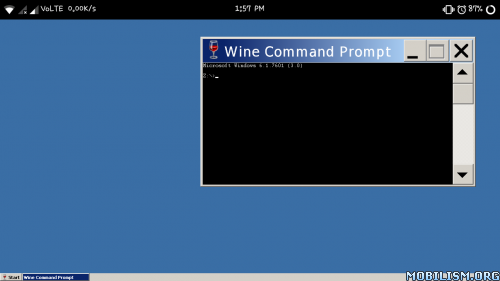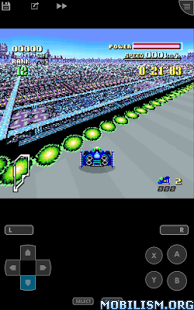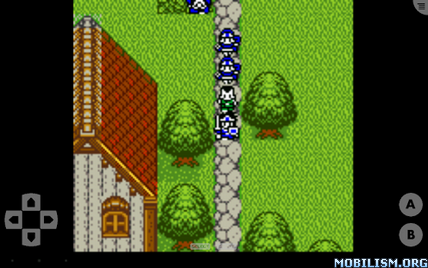Wine for Android v3.0
Requirements: 4.2+
Overview: The Wine team is proud to announce that the stable release Wine 3.0
is now available.
What’s new in Wine 3.0
======================
*** Direct3D
– A significant number of Direct3D 10 and 11 features are implemented in
this release, including:
– Compute shaders.
– Hull and domain (tessellation) shaders.
– Stream output.
– Format capability queries.
– A large number of shader model 4 and 5 shader instructions.
– Shader model 4 and 5 interpolation modifiers.
– Shader model 4 and 5 clip and cull distances.
– Indirect draws and indirect compute dispatch.
– Structured buffers.
– Byte addressable buffers.
– Append and consume buffers.
– Unordered access view counters.
– Cube-map arrays.
– Layered rendering to 3-dimensional textures and texture arrays.
– Mip-map generation.
– Conservative depth output.
– Type-less (sub)resource copies.
– Depth bias.
– The multi-threaded command stream feature serializes Direct3D rendering
commands from different threads into a single rendering thread. Its main
purpose in this release is rendering correctness, but the feature also
provides opportunities for future performance improvements. This feature
is disabled by default.
– Support for OpenGL core contexts in Direct3D is improved, to the point
that core contexts are used by default for Direct3D 10 and 11
applications on AMD and Intel graphics cards. As a result, users of those
graphics cards in combination with Mesa OpenGL drivers should no longer
need to set the “MaxVersionGL” registry key to enable Direct3D 10 and 11
support.
– The Direct3D graphics card database recognizes more graphics cards.
– New HKCUSoftwareWineDirect3D registry key:
– “csmt” (REG_DWORD)
Enable (0x1) or disable (0x0, default) the multi-threaded command
stream feature described above.
– Deprecated HKCUSoftwareWineDirect3D registry keys:
– “StrictDrawOrdering”
This has been superseded by the multi-threaded command stream feature.
– “OffscreenRenderingMode”
The “fbo” setting is the only remaining supported value. The
“backbuffer” setting, while still available, is no longer supported.
– Removed HKCUSoftwareWineDirect3D registry keys:
– “AlwaysOffscreen”
This is always enabled in this release.
– “MultiSampling”
Use the “SampleCount” (REG_DWORD) setting to force a specific
multi-sample anti-aliasing sample count for swapchain render targets
instead.
*** Graphics
– Drawing outlines of Direct2D geometry objects is implemented.
– Direct2D linear and radial gradient brushes are implemented.
– Direct2D compatibility with GDI is implemented.
– Bounds computation of Direct2D geometry objects is implemented.
– Simplification of Direct2D geometry objects is implemented.
– The OpenGL extension list is updated to OpenGL version 4.6.
– The system GLU library is only needed when the Nurbs renderer is used,
all other GLU functions are implemented internally.
– Metafile playback in GdiPlus supports most of the GdiPlus-specific
metafile record types, in addition to the standard metafile records.
– GdiPlus graphics operations take the GDI transform into account.
– Encoding image formats with a palette is supported in WindowsCodecs.
*** Android
– Wine can be built as an APK package and behaves like a proper Android
application.
– A full graphics driver is implemented. Because of restrictions of the
Android window management API, only full screen desktop mode is
supported.
– A full audio driver is implemented.
– OpenGL is supported, but it’s limited to the OpenGL ES API that is
available on Android.
– Direct3D is not supported yet, because it cannot run on top of OpenGL ES
at this point. This will be addressed during the next development cycle.
*** Kernel
– The default Windows version is set to Windows 7.
– The full semantics of named pipes are implemented, including message-mode
pipes.
– Position Independent Executables are supported, both for the Wine binary
itself and also when starting external binaries.
– Serial and parallel port devices are created automatically, with the
corresponding symlinks in the dosdevices directory. The detected ports
can be overridden through the HKLMSoftwareWinePorts key.
– Safe DLL search mode is implemented. It is enabled by default, and can be
disabled by setting the “SafeDllSearchMode” value to 0 under
HKLMSystemCurrentControlSetControlSession Manager.
– Safe process search mode is implemented. It is disabled by default but
can be requested by the application, and it can be forced by setting the
“SafeProcessSearchMode” value to 1 under
HKLMSystemCurrentControlSetControlSession Manager.
– Asynchronous I/O performance is improved by reducing the number of server
calls.
– Memory write watches work correctly when used concurrently with file I/O
on the same buffers.
– Virtual memory allocations can be arbitrarily large on 64-bit platforms.
*** User interface
– The built-in mouse cursors are redesigned, and available in higher
resolution for high DPI screens.
– The Shell Explorer, the common dialogs, and the RichEdit control properly
scale on high DPI screens.
– The screen DPI value can be overridden by setting the “LogPixels” value
under HKEY_CURRENT_USERControl PanelDesktop.
– In desktop mode, higher display resolutions with various aspect ratios
are supported.
– The Task Dialog common control is implemented.
– The Internal User Interface is supported in MSI.
– Double-buffered theme painting is implemented.
– The TWAIN library supports a user dialog for selecting the scanner
source.
– Device-independent bitmaps and metafiles can be stored into the OLE Data
Cache.
*** Desktop integration
– The StartupWMClass field is set in generated desktop files so that they
can be matched to their respective Windows binary.
– Clipboard changes from other X11 applications are detected through the
Xfixes library instead of polling.
– The RichEdit control supports pasting metafiles.
– The Program Manager DDE protocol for manipulating program entries and
groups is implemented.
– The HID service for detecting Plug & Play devices is active by default.
– Version 4 of the system tray notification protocol is supported on macOS.
*** Text and fonts
– Contextual glyph substitution is supported in UniScribe.
– Character tables are based on version 10.0.0 of the Unicode Standard.
– The Nepali and Bangla (India) locales are supported.
– Font support is compatible with the new behaviors introduced in FreeType
version 2.8.1.
*** DirectWrite
– Trailing line trimming signs in both character and word modes is
supported.
– Cluster wrapping mode is supported.
– Uniform and proportional line spacing methods are implemented.
– Oblique and bold simulation is also supported in bitmap rendering mode.
– Per-factory cache is thread safe.
– Overhang metrics evaluation for layouts are implemented.
– In-memory font file loader is implemented and is available to
applications.
*** D3DX
– Support for D3DX 9 preshaders is improved.
– Support for D3DX 9 application defined effect state managers
(ID3DXEffectStateManager) is implemented.
– Using effect pools to share effect parameters between D3DX 9 effects is
implemented.
*** Internet and networking
– UDP/TCP listeners are implemented in Web Services.
– Web Services supports the .NET Binary Format, including the string table
extension.
– Web Services supports the .NET Message Framing Protocol.
– Asynchronous support is enabled for receiving messages in Web Services.
– HTML event handling is rewritten to support standard-compliant mode.
– Multiple new standard-compliant HTML APIs are supported. HTML document
mode support is improved to preserve compatibility with documents
expecting legacy behavior.
– The WebBrowser control supports MHTML files.
– Embedding HTML documents in .NET applications is better supported.
– WinHTTP correctly parses cookie attributes.
*** Cryptography
– Cryptographic hashes are implemented internally instead of relying on
GnuTLS.
– AES encryption is supported.
– The Microsoft Root Certificate 2011 is added to the list of known
Microsoft certificates.
– The Mono and Gecko add-on packages are verified with SHA256 checksums.
*** ARM platforms
– On ARM, the floating point ABI defaults to ‘softfp’ for compatibility
with Windows binaries. It can be changed by passing the –with-float-abi
flag to configure.
– The Wine preloader is also used on ARM64 platforms.
– Relay debugging is supported on ARM64 platforms.
*** Built-in applications
– Registry importing and exporting in RegEdit is reimplemented for better
compatibility. Windows 3.1 registry files can also be imported. Registry
files are exported to Unicode format by default.
– RegEdit always shows the 64-bit view of the registry on 64-bit prefixes.
– The Reg.exe registry manipulation tool supports importing and exporting
registry files.
– The command interpreter implements the MKLINK command.
– The command interpreter supports escape characters in the prompt string.
– WineMine shows a confirmation dialog before resetting the best scores.
*** Tools
– The IDL compiler (widl) handles C++ aggregate returns in an
MSVC-compatible way.
– The resource compiler (wrc) supports translating version resources
through the po files.
– The Wine debugger (winedbg) supports printing floating point and SSE
register state.
– All Perl scripts that parse XML use the standard XML::LibXML module.
– The obsolete wineinstall tool is removed.
*** Miscellaneous
– XAudio supports float audio formats with more than 2 channels.
– The Scheduler and related classes are supported in the C++ runtime.
– SQL driver installation is supported in ODBC.
– The ProgramData well known directory is supported.
– The Mono engine is updated with upstream Mono fixes, and supports the
Mono profiler API version 2.
– The thread id is always displayed in debug traces.
*** New external dependencies
– The krb5 library is used to implement the Kerberos Authentication
Package.
– The XFixes library is used to receive clipboard change notifications.
This app has No advertisements
More Info:
https://play.google.com/store/apps/details?id=org.winehq.wineDownload Instructions:
https://dropapk.com/dsd34eahzl25





